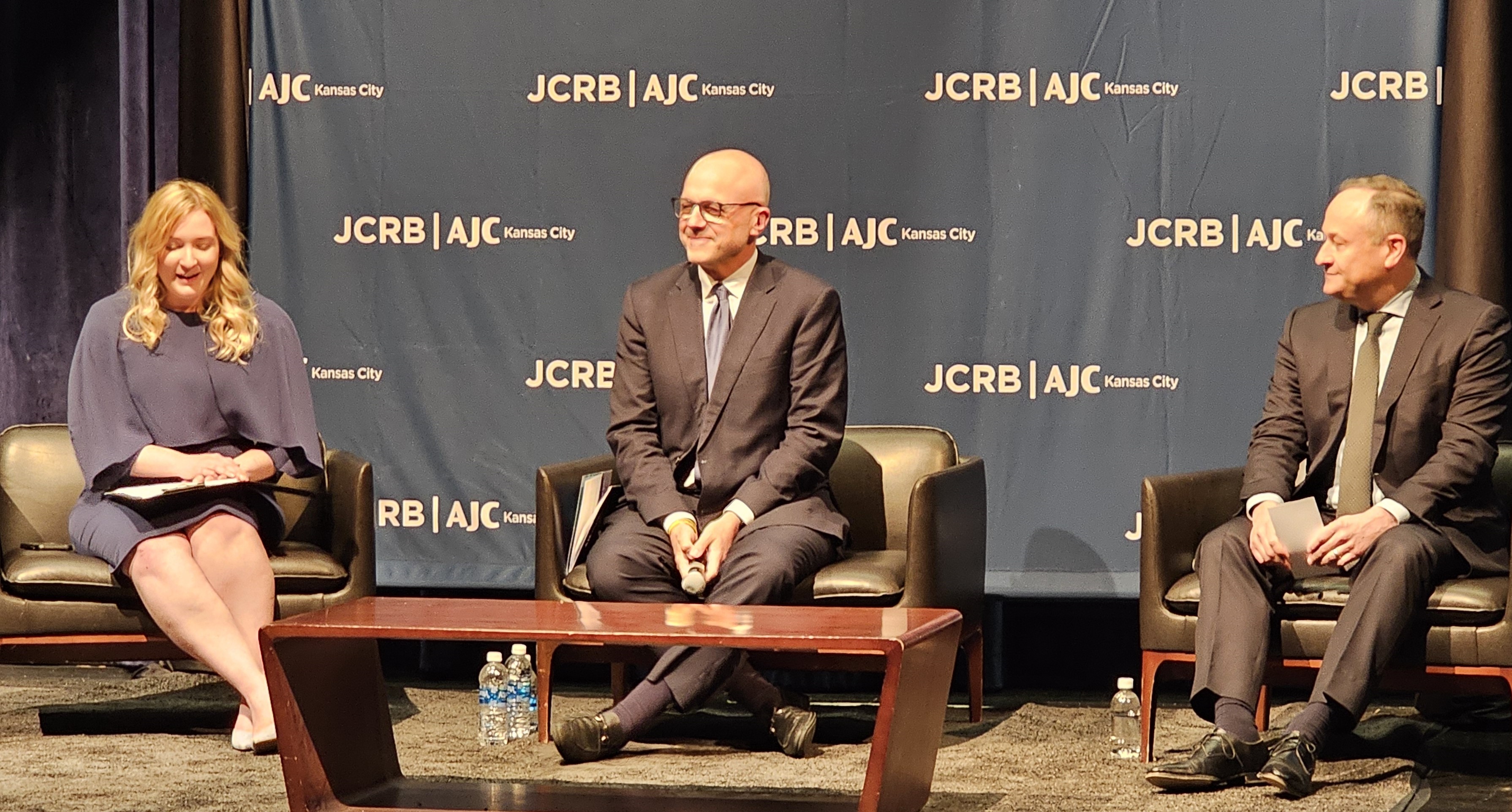In a day-long summit with upwards of 25 speakers and panelists — including United States Second Gentleman Douglas Emhoff — the Jewish Community Relations Bureau | American Jewish Committee (JCRB|AJC) emphasized the scope of the antisemitism American Jews are facing.
“Driving Out Darkness in the Heartland: 2024 Regional Summit on Combating Antisemitism” was held last Tuesday, April 16, at Rockhurst University, with hundreds of attendees representing a range of different faiths, races, ethnicities and political beliefs. JCRB|AJC gathered diverse panelists with expertise in different fields where antisemitism is experienced and must be addressed, including politics, education, social media, journalism and diversity, equity and inclusion.
JCRB|AJC Executive Director Gavriela Geller and SevenDays founder Mindy Corporon made opening remarks, summarizing the rise of antisemitism and hatred in the decade since the April 13, 2014, shootings outside of The J and Village Shalom.
A theme of the introduction and morning plenary was the understanding that the presence of antisemitism undermines the fabric and values of the United States.
“This is not a Democrat issue, it’s not a Republican issue — this is an American issue,” Geller said. “We have all seen the impact to a society when antisemitism is allowed to grow, and it threatens our American values of pluralism, of democracy, of the things that make us proud to be American. And so that’s why we must come together as Americans… to say that antisemitism is not welcome here — not in our homes, not on our campuses, not in the heartland, not in America.”
Holly Huffnagle, AJC’s U.S. director of combating antisemitism, presented statistics from AJC’s “The State of Antisemitism in America 2023” survey of American Jews, including the increase in noticed and experienced antisemitic incidents and greater worries and fears about being outwardly Jewish. She then led a discussion with former Charlottesville, Virginia, Mayor Mike Signer and Project Shema Executive Director Oren Jacobson.
Signer and Jacobson addressed antisemitism on both ends of the political spectrum. Signer was Charlottesville’s mayor in August of 2017, when white supremacists participated in the “Unite the Right” rally, spreading Jew-hatred and conspiracy theories. Jacobson leads Project Shema, which was built by progressive Jews with the focus of addressing contemporary antisemitism. Both discussed the change of the political atmosphere and civil discourse since 2016, “which agitated both the far left and far right,” Signer said.
Though the angles from which both sides come might be different, the resulting antisemitism and its consequences remain equally damaging.
Following the opening discussions, attendees could choose one of three breakout sessions — “Making Space for the Jewish Community in Diversity, Equity, and Inclusion Frameworks,” “From Memes to Manifestos: Antisemitism in the Digital Age” and “Setting the Record Straight: Zionism, Israel, and Antisemitism.” Three more breakout sessions were available after lunch: “Stronger Together: Coalition-Building in a Polarized Society,” “Creating Safer School Environments” and “From Chaos to Clarity: Navigating Disinformation Through Media Literacy.”
At the summit’s closing plenary, a prerecorded message from Kansan U.S. Senator Jerry Moran expressed his support of the Jewish community and condemnation of antisemitism. JCRB|AJC Board President Barry Kaseff then highlighted the work of the organization, its staff and the summit, before introducing AJC CEO Ted Deutch and Second Gentleman Douglas Emhoff.
Before beginning the conversation with Geller and Deutch, Emhoff made remarks about the Iranian attack on Israel during the previous weekend, saying that the White House stands firmly with Israel.
“This weekend, in the face of an unprecedented attack on Israel, President Biden and Vice President Harris make it clear that the United States’ commitment to Israel security is ironclad,” Emhoff said.
Emhoff continued that in the wake of the Oct. 7 attacks on Israel by Hamas, “the work that I’ve been doing as part of the administration will continue. It’s taken on more importance, and I’m not going to stop. I have no choice but to be involved.”
Deutch shared the words of his late father, a World War II veteran, who told him that there were “two things that we needed to remember in our family. One is that we were Jewish, and two is that we were American, and that those two ideas are inextricably linked.”
Directly addressing non-Jewish attendees, Deutch said, “We need you to stand with us, because when we’re at risk, our country as a whole is at risk, and if we’re going to bring the country together, then we’ve got to come together to combat antisemitism.”
Emhoff parted with the message that “we still have to be joyful about being Jewish” in the face of all the antisemitism the Jewish community faces. Deutch concurred, and he ended with a Passover message and reminder of the hostage situation still happening in Israel.
“As we sit here today, on day 193 — 193 days in captivity for 133 hostages, including American citizens — the whole idea of Passover and freedom has never been more profound,” Deutch said. “Yes, we should celebrate at our Seder tables… [but] we need to think about them even as we’re celebrating and as we’re thinking about what the opportunities are for us and for our future.”
Geller closed the summit with the strong message of continuing to fight against antisemitism, aiming to to celebrate Jewishness openly and fearlessly and make it “embarrassing” to be an antisemite.
“When people on the left and far right today say that the world would be better without Zionists — the antisemites’ favorite codeword of the day [for Jews] — we must not pretend we don’t know what they mean,” Geller said. “...All of us here stand for a world in which all people are free and safe and equal. If we hold our values close, if we have our facts straight and if we commit some moral courage, we can and we will drive back the darkness of antisemitism.”



